Strictly Personal
In the years ahead, a rainbow flag divide is going to emerge within East Africa, By Charles Onyango-Obbo
Published
1 year agoon

Going into this week, Uganda already had the most severe anti-homosexuality law in the East African Community, punishing the “unnatural act” with up to life imprisonment.
On Tuesday, a fully charged Parliament passed a controversial new law that raised the stakes, providing death as the penalty for “aggravated homosexuality.” By so doing, Uganda set itself apart from an already fairly homophobic East Africa, throwing its lot with Nigeria, Mauritania, Sudan, and Somalia as the only countries in Africa where homosexuality is punishable by death.
East African national and state attitudes toward lesbian, gay, bisexual, transgender, queer, questioning, intersex, and asexual (LGBTQIA) rights present a mixed bag. One would have expected that the country that is most locked into the global economy, Kenya, would have the most liberal legal regime on LGBTQIA rights. No. In the statute books, homosexuality is criminalised in Kenya, but in practice, gay people have more public wiggle room. The courts have expanded their rights based on a liberal reading of the country’s progressive 2010 Constitution.
In late February, the Kenyan Supreme Court ruled that the National Gay and Lesbian Human Rights Commission (NGLHRC) be allowed to officially register as a non-governmental organisation, ending a ten-year legal battle.
New anti-gay crusade
As in Uganda, the ruling aroused politicians and church people to launch a new anti-gay crusade in Kenya. This disparate picture also makes it hard to locate common factors driving homophobia. It can’t be the level of corruption. Rwanda is the least corrupt EAC country, but its legal regime on gay rights is at the same level as DRC’s, which is struggling at the bottom, with Burundi and South Sudan for the most corrupt title. Uganda wouldn’t be the most punitive because it is not the most corrupt EAC nation.
It can’t be underlying attitudes toward transactional sex. If it were, South Sudan and DRC, where prostitution is legal, would have the most liberal laws towards homosexuality. In fact, the irony here is that in Uganda, Kenya and Tanzania, where prostitution is illegal, it is more widespread than in the EAC countries where it is legal.
Political and social crises
What seems to explain the level of homophobia are political and social crises. Deep political fractures, as in Kenya and Uganda, tend to produce big anti-LGBTQIA moments because homophobia is a great bipartisan issue. The anti-gay clamour in Kenya produced a brief and rare consensus between the country’s bitterly warring political factions.
In Uganda, the frontline troops in the latest stringent law were from the opposition ranks. The two legislators who dissented on record against the bill were both from President Yoweri Museveni’s ruling National Resistance Movement (NRM), one his former legal adviser.
Uganda and the leading homophobe nations in EAC also face a social crisis, expressed in, for example, scandalously high teenage pregnancies and epidemics of defilement.
Least anti-gay hysteria
By contrast, Rwanda, where there is the least anti-gay hysteria currently, has the region’s lowest rate of teenage pregnancies.
Uganda also has the highest alcohol consumption in East Africa, and the illegal variety of the brew drunk by many in the country is wasting away hundreds of thousands of young lives.
To compound matters, Uganda is also undergoing the most far-reaching challenge to the traditional family and the closest thing you have to a subversive sexual revolution in East Africa today. The new anti-homosexuality bill, therefore, is a larger platform to organise a national morality comeback. In that sense, it is about something other than gay sex.
Married couple
This was signalled by the bill’s architect Asuman Basalirwa, a member of a minor opposition party in Parliament. Appearing before a committee set up to review his bill, he said the law needs to ban oral and anal sex between a married couple: “I have had an opportunity to speak to some counsellors; they have talked of incidents where a man is married to a woman and instead of using the normal address, is using the wrong address,” he said.
“They said this aspect is lacking in the bill, and I want at this point in time to bring it to the attention of the committee that it should be considered,” Basalirwa added.
“Wrong address” was an expression coined by President Museveni to connote any other form of sex other than via the traditional heterosexual channels sanctioned by the Bible.
Future versions
Therefore, Uganda’s latest anti-homosexuality bill is by no means its last, at least not during the rule of President Museveni. Future versions, coming even as early as 2025, before Museveni goes for a record-shattering ninth term in office in 2026, shouldn’t be a surprise. They will likely address Basalirwa’s concerns about deviations in heterosexual marriages.
In a similar vein, a proposed bill on assisted reproductive technology requires a fertility centre to demand proof of marriage from a couple seeking its services. The bill thus effectively bans fertility treatment for unmarried people, who are seen as the scourge on Uganda’s moral purity.
Collectively, this will enable the aging political class to have a weapon against the new generation of younger politicians and their supporters, who will be cast as perverts who don’t honour the nation’s cultural codes.
In the years ahead, a rainbow flag divide could emerge within the region. With the more sexually open-minded East African capitals attracting global activities that don’t require one to pass an LGBTQIA test to attend, and those that are avoided by a sexually ambivalent global citizenry, afraid they might be hanged.
You may like
-
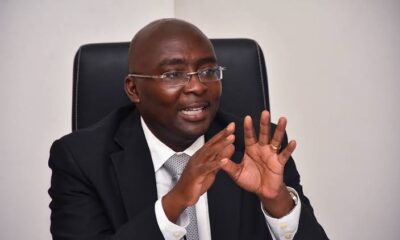

Ghana’s VP Bawumia throws weight behind anti-LGBTQ campaign
-
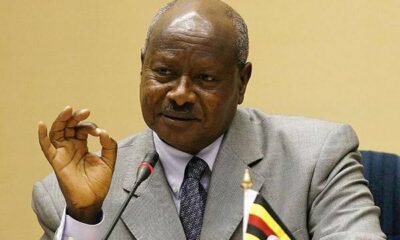

Members of a Ugandan band arrested for complaining President Museveni’s speech too long
-
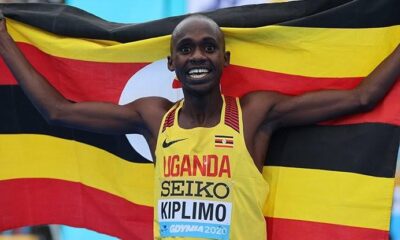

Ugandan World Cross Country champion Jacob Kiplimo involved in near-fatal accident
-


AfDB bans Chinese road builder Chico over ‘fraudulent activity’ in Uganda
-


Uganda: Museveni’s son newly appointed as military chief to fight corruption
-
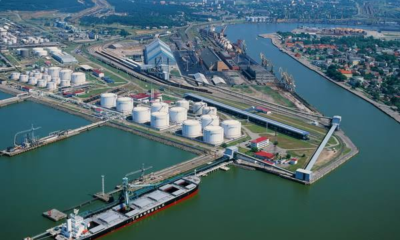

Kenya, Uganda settle oil import dispute
Strictly Personal
Air Peace, capitalism and national interest, By Dakuku Peterside
Published
2 days agoon
April 16, 2024
Nigerian corporate influence and that of the West continue to collide. The rationale is straightforward: whereas corporate activity in Europe and America is part of their larger local and foreign policy engagement, privately owned enterprises in Nigeria or commercial interests are not part of Nigeria’s foreign policy ecosystem, neither is there a strong culture of government support for privately owned enterprises’ expansion locally and internationally.
The relationship between Nigerian businesses and foreign policy is important to the national interest. When backing domestic Nigerian companies to compete on a worldwide scale, the government should see it as a lever to drive foreign policy, and national strategic interest, promote trade, enhance national security considerations, and minimize distortion in the domestic market as the foreign airlines were doing, boost GDP, create employment opportunities, and optimize corporate returns for the firms.
Admitted nations do not always interfere directly in their companies’ business and commercial dealings, and there are always exceptions. I can cite two areas of exception: military sales by companies because of their strategic implications and are, therefore, part of foreign and diplomatic policy and processes. The second is where the products or routes of a company have implications for foreign policy. Air Peace falls into the second category in the Lagos – London route.
Two events demonstrate an emerging trend that, if not checked, will disincentivize Nigerian firms from competing in the global marketplace. There are other notable examples, but I am using these two examples because they are very recent and ongoing, and they are typological representations of the need for Nigerian government backing and support for local companies that are playing in a very competitive international market dominated by big foreign companies whose governments are using all forms of foreign policies and diplomacy to support and sustain.
The first is Air Peace. It is the only Nigerian-owned aviation company playing globally and checkmating the dominance of foreign airlines. The most recent advance is the commencement of flights on the Lagos – London route. In Nigeria, foreign airlines are well-established and accustomed to a lack of rivalry, yet a free-market economy depends on the existence of competition. Nigeria has significantly larger airline profits per passenger than other comparable African nations. Insufficient competition has resulted in high ticket costs and poor service quality. It is precisely this jinx that Air Peace is attempting to break.
On March 30, 2024, Air Peace reciprocated the lopsided Bilateral Air Service Agreement, BASA, between Nigeria and the United Kingdom when the local airline began direct flight operations from Lagos to Gatwick Airport in London. This elicited several reactions from foreign airlines backed by their various sovereigns because of their strategic interest. A critical response is the commencement of a price war. Before the Air Peace entry, the price of international flight tickets on the Lagos-London route had soared to as much as N3.5 million for the economy ticket. However, after Air Peace introduced a return economy class ticket priced at N1.2 million, foreign carriers like British Airways, Virgin Atlantic, and Qatar Airways reduced their fares significantly to remain competitive.
In a price war, there is little the government can do. In an open-market competitive situation such as this, our government must not act in a manner that suggests it is antagonistic to foreign players and competitors. There must be an appearance of a level playing field. However, government owes Air Peace protection against foreign competitors backed by their home governments. This is in the overall interest of the Nigerian consumer of goods and services. Competition history in the airspace works where the Consumer Protection Authority in the host country is active. This is almost absent in Nigeria and it is a reason why foreign airlines have been arbitrary in pricing their tickets. Nigerian consumers are often at the mercy of these foreign firms who lack any vista of patriotism and are more inclined to protect the national interest of their governments and countries.
It would not be too much to expect Nigerian companies playing globally to benefit from the protection of the Nigerian government to limit influence peddling by foreign-owned companies. The success of Air Peace should enable a more competitive and sustainable market, allowing domestic players to grow their network and propel Nigeria to the forefront of international aviation.
The second is Proforce, a Nigerian-owned military hardware manufacturing firm active in Rwanda, Chad, Mali, Ghana, Niger, Burkina Faso, and South Sudan. Despite the growing capacity of Proforce in military hardware manufacturing, Nigeria entered two lopsided arrangements with two UAE firms to supply military equipment worth billions of dollars , respectively. Both deals are backed by the UAE government but executed by UAE firms.
These deals on a more extensive web are not unconnected with UAE’s national strategic interest. In pursuit of its strategic national interest, India is pushing Indian firms to supply military equipment to Nigeria. The Nigerian defence equipment market has seen weaker indigenous competitors driven out due to the combination of local manufacturers’ lack of competitive capacity and government patronage of Asian, European, and US firms in the defence equipment manufacturing sector. This is a misnomer and needs to be corrected.
Not only should our government be the primary customer of this firm if its products meet international standards, but it should also support and protect it from the harsh competitive realities of a challenging but strategic market directly linked to our national military procurement ecosystem. The ability to produce military hardware locally is significant to our defence strategy.
This firm and similar companies playing in this strategic defence area must be considered strategic and have a considerable place in Nigeria’s foreign policy calculations. Protecting Nigeria’s interests is the primary reason for our engagement in global diplomacy. The government must deliberately balance national interest with capacity and competence in military hardware purchases. It will not be too much to ask these foreign firms to partner with local companies so we can embed the technology transfer advantages.
Our government must create an environment that enables our local companies to compete globally and ply their trades in various countries. It should be part of the government’s overall economic, strategic growth agenda to identify areas or sectors in which Nigerian companies have a competitive advantage, especially in the sub-region and across Africa and support the companies in these sectors to advance and grow to dominate in the African region with a view to competing globally. Government support in the form of incentives such as competitive grants ,tax credit for consumers ,low-interest capital, patronage, G2G business, operational support, and diplomatic lobbying, amongst others, will alter the competitive landscape. Governments and key government agencies in the west retain the services of lobbying firms in pursuit of its strategic interest.
Nigerian firms’ competitiveness on a global scale can only be enhanced by the support of the Nigerian government. Foreign policy interests should be a key driver of Nigerian trade agreements. How does the Nigerian government support private companies to grow and compete globally? Is it intentionally mapping out growth areas and creating opportunities for Nigerian firms to maximize their potential? Is the government at the domestic level removing bottlenecks and impediments to private company growth, allowing a level playing field for these companies to compete with international companies?
Why is the government patronising foreign firms against local firms if their products are of similar value? Why are Nigerian consumers left to the hands of international companies in some sectors without the government actively supporting the growth of local firms to compete in those sectors? These questions merit honest answers. Nigerian national interest must be the driving factor for our foreign policies, which must cover the private sector, just as is the case with most developed countries. The new global capitalism is not a product of accident or chance; the government has choreographed and shaped it by using foreign policies to support and protect local firms competing globally. Nigeria must learn to do the same to build a strong economy with more jobs.
Strictly Personal
This is chaos, not governance, and we must stop it, By Tee Ngugi
Published
1 week agoon
April 10, 2024
The following are stories that have dominated mainstream media in recent times. Fake fertiliser and attempts by powerful politicians to kill the story. A nation of bribes, government ministries and corporations where the vice is so routine that it has the semblance of policy. Irregular spending of billions in Nairobi County.
Billions are spent in all countries on domestic and foreign travel. Grabbing of land belonging to state corporations, was a scam reminiscent of the Kanu era when even public toilets would be grabbed. Crisis in the health and education sectors.
Tribalism in hiring for state jobs. Return of construction in riparian lands and natural waterways. Relocation of major businesses because of high cost of power and heavy taxation. A tax regime that is so punitive, it squeezes life out of small businesses. Etc, ad nauseam.
To be fair, these stories of thievery, mismanagement, negligence, incompetence and greed have been present in all administrations since independence.
However, instead of the cynically-named “mama mboga” government reversing this gradual slide towards state failure, it is fuelling it.
Alternately, it’s campaigning for 2027 or gallivanting all over the world, evoking the legend of Emperor Nero playing the violin as Rome burned.
A government is run based on strict adherence to policies and laws. It appoints the most competent personnel, irrespective of tribe, to run efficient departments which have clear-cut goals.
It aligns education to its national vision. Its strategies to achieve food security should be driven by the best brains and guided by innovative policies. It enacts policies that attract investment and incentivize building of businesses. It treats any kind of thievery or negligence as sabotage.
Government is not a political party. Government officials should have nothing to do with political party matters. They should be so engaged in their government duties that they literally would not have time for party issues. Government jobs should not be used to reward girlfriends and cronies.
Government is exhausting work undertaken because of a passion to transform lives, not for the trappings of power. Government is not endless campaigning to win the next election. To his credit, Mwai Kibaki left party matters alone until he had to run for re-election.
We have corrupted the meaning of government. We have parliamentarians beholden to their tribes, not to ideas.
We have incompetent and corrupt judges. We have a civil service where you bribe to be served. Police take bribes to allow death traps on our roads. We have urban planners who plan nothing except how to line their pockets. We have regulatory agencies that regulate nothing, including the intake of their fat stomachs.
We have advisers who advise on which tenders should go to whom. There is no central organising ethos at the heart of government. There is no sense of national purpose. We have flurries of national activities, policies, legislation, appointments which don’t lead to meaningful growth. We just run on the same spot.
Tee Ngugi is a Nairobi-based political commentator
EDITOR’S PICK


Top European, Asian clubs on alert as Super Eagles keeper set to make contract decision
Some top clubs in Europe and Asia have been put on alert as Super Eagles and Chippa United goalkeeper, Stanley...


IMF says South Africa needs to do more to cut spending, lower debt-to-GDP ratio
A top official from the International Monetary Fund has revealed that South Africa needs to do more to cut spending...


Burkina Faso expels 3 French diplomats over ‘subversive activities’
According to a letter quoted by Reuters on Thursday, three French diplomats have been sent back to France by Burkina...


Nigeria’s MAX partners Ghana’s Kofa in e-bike financing deal
Nigeria’s electric vehicle solutions provider, MAX, has announced striking a partnership deal with Ghana’s innovator in energy networks, Kofa, that...


Zambia asks EU to help strengthen its democratic initiatives ahead of 2026 elections
The Zambian government has called on the European Union (EU) to help in strengthening democratic initiatives in the country as...


Nigeria destined to become major global economy under Tinubu— VP Shettima
Nigeria’s Vice President, Kashim Shettima, has predicted that the country is destined to become a major economic force in the...


Nigeria’s central bank insists depleting external reserves not due to Naira defence
According to the Central Bank of Nigeria (CBN), the big drop in the country’s foreign exchange reserves was not due...


African Guarantee Fund partners Nordic Development Fund to launch green finance in Nigeria
The African Guarantee Fund (AGF) has teamed up with the Nordic Development Fund (NDF) to launch a green finance fund...


Ethiopia’s Lemma, Kenya’s Obiri give Africa double podium finish at Boston Marathon
Ethiopia’s long distance runner, Sisay Lemma, and Kenyan female marathon sensation, Hellen Obiri, teamed up to give Africa a double...


Davido’s ‘Unavailable’ achieves milestone with 100 million views on YouTube, Spotify
Nigeria’s Afrobeats sensation, David Adeleke, popularly known as Davido, has landed another milestone after his hit single, “Unavailable’, surpassed 100...
Trending
-

 Sports1 day ago
Sports1 day agoEthiopia’s Lemma, Kenya’s Obiri give Africa double podium finish at Boston Marathon
-

 Metro2 days ago
Metro2 days agoZambia: Many feared injured as UPND, PF supporters clash in court
-

 Culture1 day ago
Culture1 day agoDavido’s ‘Unavailable’ achieves milestone with 100 million views on YouTube, Spotify
-
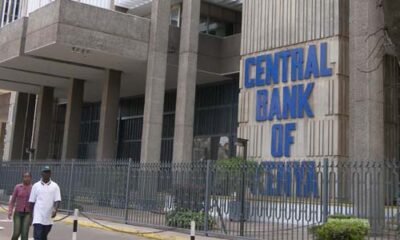
 VenturesNow2 days ago
VenturesNow2 days agoInvestors’ wealth drops by $968 million on Nairobi Securities Exchange


